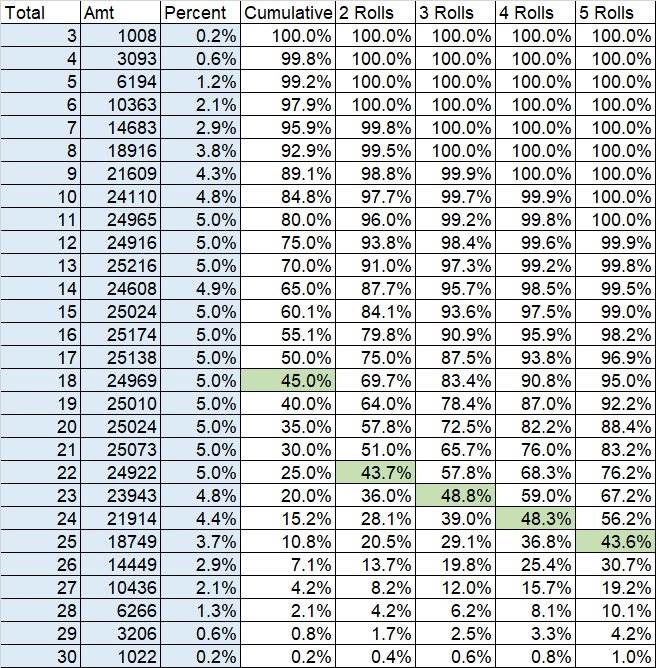
The rules of this dice game are that a D4, a D6 and a D20 are all rolled up to three times. The punter is trying to roll a total of 23 or higher in each turn and wins if they do. Otherwise, the house wins. The bet is an even bet where a punter gets their initial stake plus their stake again if they win (i.e. 1:1 odds).
It is important that each turn of up to three rolls is separate. If a score of 23 or over is rolled a new round would begin.
I wanted to devise a game to play with dice based on the Chevalier de Mere's dice game. I also wanted this game to use some dice that my sister got me for Christmas 2023.
The Chevalier de Mere figured out though practical experimentation that you are more likely to roll a six throwing a fair D6 up to four times than you are to roll double-six rolling two fair D6 dice up to 24 times.
I used Microsoft Excel to simulate the chance of getting some different totals with different dice. I then calculated the chance of getting a certain total or higher after one to five rolls. After a few trials with my brother I decided this was the best variation. I still need a name for it.
With an evens bet the punter will win 48.8% of the time and the house will win 51.2% of the time. On average the punter will lose 2.4p per £1 bet. Due to random variation some players will win especially in the short term.
However, after 10,000 bets, 95% of the time a punter will lose between £45 and £435 (if they stick to £1 bets). This means way fewer than one in twenty players would have made any money if they were rich and foolish enough to make 10,000 bets of £1.
It also means over a long enough timescale, the house would be almost guaranteed to make money. This is how casinos make money. They need a lot of tables and slot machines though to protect themselves from variability in luck.

Table 1 shows how I figured out the probabilities. The Amt column shows the number of times each total came up in 500,000 simulations on Excel. You could use the table to see other possible variations. For example the house could get a better advantage by betting on a player rolling 18 or higher in just one roll or could give 2:1 odds on rolling 25 or higher in up to three rolls.
Home